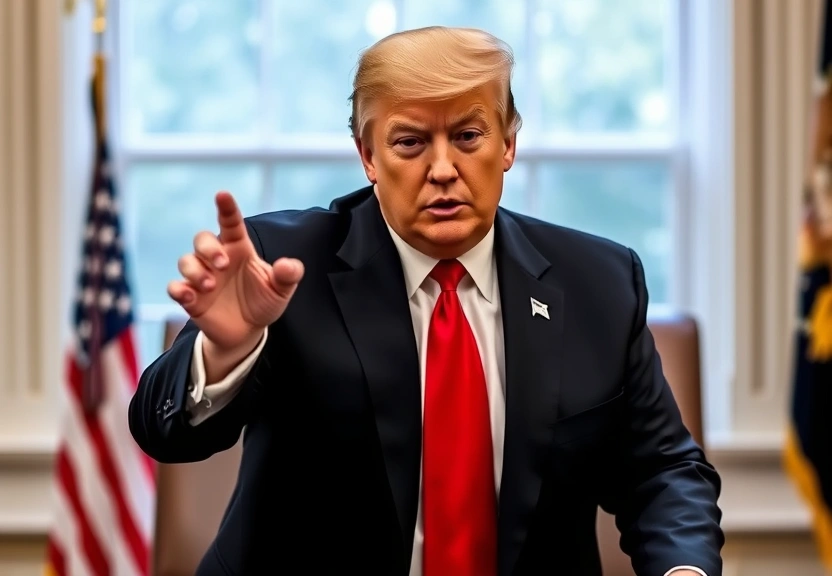Trump’s Bold Threat to Fire Fed Chair Powell: A Risky Gamble for Markets
In the world of finance, few events can send shockwaves through the market like the prospect of leadership changes at the Federal Reserve. Recently, reports surfaced that President Donald Trump was contemplating firing the Federal Reserve Chairman Jerome Powell. This announcement led to significant movements in the stock market, causing stocks and the U.S. dollar to tumble, while long-dated Treasury yields surged higher. The implications of such a decision could have far-reaching consequences for both domestic and international markets.

This article will delve into the ramifications of President Trump’s threats toward the Federal Reserve and Chairman Powell. We will explore the market’s immediate response, the potential long-term effects of such actions, and how this situation fits into the broader context of U.S. monetary policy. By examining these components, we aim to provide a comprehensive understanding of why this bold move is considered a risky gamble for markets.
The Federal Reserve’s Role in the Economy
The Federal Reserve, often referred to simply as “the Fed,” plays a critical role in the U.S. economy. Established in 1913, the Fed’s primary responsibilities include managing inflation, supervising and regulating banks, and maintaining financial stability. It achieves these goals through the implementation of monetary policy, which involves adjusting interest rates and influencing money supply.
The Importance of Independence
One of the key principles that underpin the Federal Reserve’s effectiveness is its independence from political influence. This autonomy allows the Fed to make decisions based on economic data rather than political pressures. When this independence is threatened, it raises concerns among investors about the Fed’s ability to effectively manage the economy.
Market Reactions to Trump’s Threat
When the news broke that President Trump was considering firing Jerome Powell, the immediate reaction from the markets was swift and severe. Stocks fell sharply, reflecting investor anxiety and uncertainty. The U.S. dollar also weakened, signaling a loss of confidence in the economic leadership. Conversely, long-dated Treasury yields surged, indicating that investors were seeking safer assets in a climate of uncertainty.
Stock Market Decline
The stock market’s response to Trump’s threat was notable. Major indices, including the S&P 500 and the Dow Jones Industrial Average, experienced sharp declines. This downturn can be attributed to fears of increased volatility and uncertainty about future monetary policy. Investors typically react negatively to political interference in central banking, leading to sell-offs in equities.
U.S. Dollar Weakening
The U.S. dollar, often seen as a safe haven currency, also took a hit. A declining dollar can exacerbate inflation and lead to higher import costs, which can further strain the economy. Investors started to question the stability of U.S. monetary policy, leading to a decrease in demand for the dollar.
The Implications of Firing Jerome Powell
If President Trump were to follow through on his threat to fire Jerome Powell, the implications could be profound. Such an action could undermine the credibility of the Federal Reserve and create an environment of uncertainty in the financial markets.
Impact on Monetary Policy
A change in leadership at the Fed could lead to shifts in monetary policy that might not align with market expectations. This unpredictability can cause investors to reassess their strategies, leading to increased volatility in the markets. Furthermore, if the new appointee is perceived as more politically aligned with the President’s agenda, it could lead to a departure from the Fed’s traditional focus on economic data and stability.
Investor Confidence
Investor confidence is crucial for a healthy market. Political interference in the Fed can lead to skepticism about the future direction of U.S. economic policy. If investors believe that the Fed is no longer independent, they may pull back on investments, leading to slower economic growth. This loss of confidence could have a cascading effect on various sectors of the economy.
The Long-Term Effects on the Economy
The potential long-term effects of firing Jerome Powell extend beyond immediate market reactions. A shake-up at the top of the Federal Reserve could lead to broader economic consequences that may affect both consumers and businesses.
Inflation Concerns
If the Fed is perceived as being politically pressured, managing inflation could become more challenging. The Fed’s primary mandate includes maintaining price stability, and any deviation from this goal could lead to higher inflation rates. Businesses might face increased costs, which can be passed on to consumers, further straining household budgets.
Global Economic Implications
The U.S. dollar is the world’s primary reserve currency, and instability in U.S. monetary policy can have global repercussions. A decline in the dollar’s value can affect international trade and investments, leading to a ripple effect throughout the global economy. Countries that rely heavily on the dollar for trade may find themselves adversely affected by fluctuations in its value.
Key Takeaways
- Trump’s threat to fire Jerome Powell has raised concerns about the independence of the Federal Reserve.
- The stock market reacted negatively, with major indices experiencing significant declines.
- The U.S. dollar weakened, reflecting decreased confidence in U.S. monetary policy.
- Firing Powell could lead to unpredictable shifts in monetary policy, impacting investor confidence.
- Long-term economic consequences could include inflationary pressures and global economic instability.
Frequently Asked Questions (FAQ)
1. What would happen if President Trump fired Jerome Powell?
If President Trump were to fire Jerome Powell, it would create significant uncertainty in the financial markets and could lead to volatility in stock prices and the U.S. dollar.
2. Why is the Federal Reserve’s independence important?
The independence of the Federal Reserve is crucial for effective monetary policy because it allows decisions to be made based on economic data rather than political pressures, maintaining market confidence.
3. How do markets typically respond to political interference in the Federal Reserve?
Markets generally respond negatively to political interference in the Federal Reserve, often resulting in stock sell-offs, currency depreciation, and increased volatility in Treasury yields.
4. What are the potential long-term effects of a change in Fed leadership?
Long-term effects may include increased inflation, reduced investor confidence, and potential instability in the global economy due to changes in U.S. monetary policy.
5. How can investors protect themselves in a volatile market environment?
Investors can protect themselves by diversifying their portfolios, focusing on defensive stocks, and considering safer assets like Treasury bonds during periods of uncertainty.
Conclusion
President Trump’s bold threat to fire Federal Reserve Chairman Jerome Powell serves as a stark reminder of the precarious balance between politics and economic policy. The immediate market reactions underscore the sensitivity of investors to perceived disruptions in the central bank’s independence. While the short-term impacts are already evident through declines in stocks and the dollar, the long-term implications could reshape the landscape of the U.S. economy. As we navigate this uncertain terrain, it becomes increasingly vital for investors to remain informed and prepared for potential shifts in monetary policy that could arise from this unfolding situation.
📰 Original Source
Este artigo foi baseado em informações de: https://www.marketwatch.com/story/trump-may-be-testing-the-waters-by-threatening-to-fire-feds-powell-why-hes-playing-a-dangerous-game-e1fc99e5?mod=mw_rss_topstories


